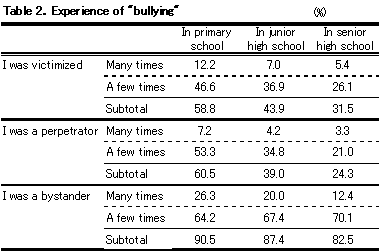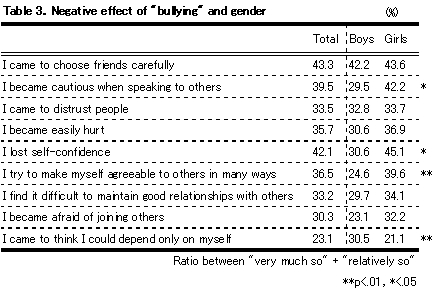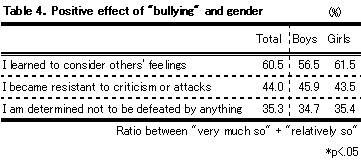This article is a summary of Benesse Educational Research Institute, 2003, Ijime no Nokoshita Mono, Monografu Shogakusei, Vol.23-2. Tokyo: Benesse Corporation.
Since the 1980s, "bullying" has been discussed as an issue in education as well as in society as a whole. Although educational policies to minimize the incidence of "bullying" have been implemented, it continues in the world of children. The results and findings of a questionnaire survey conducted among current university and college students are summarized below.
Reviewing past experiences of "bullying" will help understand the current situation. Emphasis is placed on those respondents who have been victimized by "bullying" in order to see how it has subsequently affected their lives.
Table 1 shows whether or not the students experienced "bullying" in their environment. More than 80% of the students responded that there were incidents of "bullying" in primary and junior high schools, but this percentage dramatically decreases to about 30% in senior high schools. Student life in and out of school becomes more diversified after students enter senior high school. The dramatic decrease in bullying may be due to an eventful school life because students do not have to resort to "bullying" to relieve stress and depressive moods.

Bullying involves three parties: victims who are bullied, perpetrators who bully, and onlookers. Table 2 shows the experiences of three parties broken down by school. In further detail, those who were victims and perpetrators in primary school each account for 60%, 40% in junior high schools, and 20 to 30% in senior high schools. Those who were bystanders in primary and junior high schools account for 90%, and 80% in senior high schools. These percentages indicate that almost all of the college and university students had an experience of "bullying" in some form or other.

How intense is their memory of the bullying experience? About 60% answered that "it is now completely a thing of the past" regardless of whether they had been victims, perpetrators or bystanders. The remaining 40%, however, indicate that they "sometimes recall the experience." It is apparent that the incident has left traces of trauma in quite a number of the students.
What has become of the victims? About 30% were able to rejoin their former group of friends while another 30 % remained alienated from their classmates, and the rest withdrew from school and some even committed suicide according to the reponses by university students.
Bullying often affects the subsequent lives of children. This finding confirms that this issue is one that must be addressed. How did the victims see their experience of "bullying" in terms of the subsequent effect on them? The following discussion concerns only those who have experienced "bullying" in the past. According to the respondents, bullying has had a negative effect on their attitude toward others, their view of health and their basic personality. Table 3. On the other hand, some consider that the experience has helped to strengthen their character. Table 4.


The other survey result showed that 28.8% felt that bullying had influenced their choice of major in college, and 32.6% indicated that the experience had affected their choice of future career. Overall, about 30% felt "bullying" had affected their future direction.
What aspects of the students' lives were affected in concrete terms? When asked if they felt they would have been different if they had not experienced "bullying," 8.1% responded that they would have performed better in academically, and 5.7% said that they would have entered another university, admission to which was more difficult than to their current school. As for personality, 31.8% indicated that they would have become more positive, and about 25% responded that they would have been less cynical, more cheerful, and would have many more friends. We see that bullying may have a more pronounced effect on personality than on academic performance.
Since the survey was conducted of university and college students, a greater number of youths who did not go to university may be feeling the effect of bullying on their academic performance more intensely. Some may have opted not to go to college because they were victims of "bullying." Perhaps because this survey is limited to college and university students, not many respondents felt that bullying had affected their academic performance.
"Bullying" should under no circumstances be affirmed. However, the bitter experience may be recognized to have a positive effect in the victims' lives subsequently. However, resolution of and countermeasures for the problem should be taken as quickly as possible since bullying does affect the later life and character formation of victims. At the same time, importance should be given to aftercare measures that will heal the damage done to their hearts and minds.














